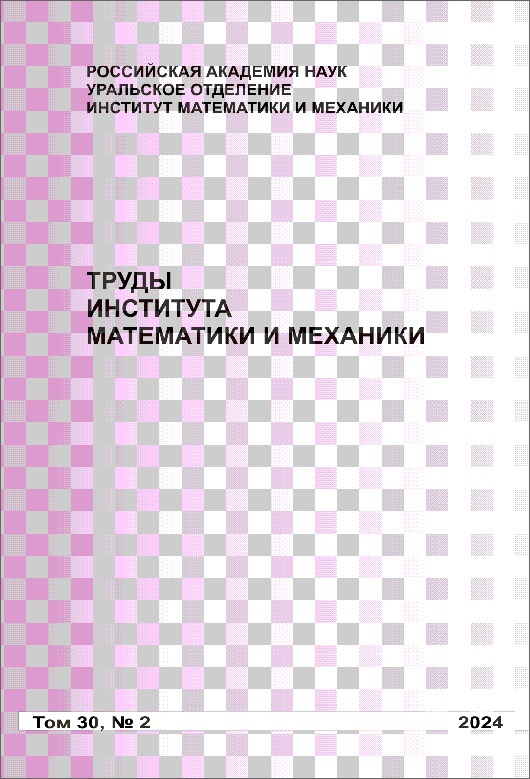|
On the equivalence of some relations in different metrics between norms, best approximations, and moduli of smoothness of periodic functions and their derivatives
N. A. Il'yasov
Baku State University
Abstract:
We propose a method capable, in particular, of establishing the equivalence of known upper estimates for the $L_q(\mathbb T)$-norm $\|f^{(r)}\|_q$, the best approximation $E_{n-1}(f^{(r)})_q$, and the $k$th-order modulus of smoothness $\omega_k(f^{(r)};\pi/n)_q$ in terms of elements of the sequence $\{E_{n-1}(f)_p\}_{n=1}^\infty$ of best approximations of a $2\pi$-periodic function $f\in L_p(\mathbb T)$ by trigonometric polynomials of order at most $n-1$, $n\in \mathbb N$, where $r\in \mathbb Z_+$ ($f^{(0)}=f)$, $1 < p < q < \infty$, and $\mathbb T=(-\pi,\pi]$. The principal result of the paper is the following statement. Let $1 < p < q < \infty$, $r\in \mathbb Z_+$, $k\in \mathbb N$, $\sigma=r+1/p-1/q$, $f\in L_p(\mathbb T)$, and $E(f;p;\sigma;q)\equiv\Big(\sum_{\nu=1}^{\infty}\nu^{q\sigma-1}E_{\nu-1}^{q}(f)_{p}\Big)^{1/q} < \infty$. Then the following inequalities are equivalent in the sense that each of them implies the other two: (a) $\|f^{(r)}\|_q\le C_1(r,p,q)\left\{(1-\chi (r))\|f\|_p+E(f;p;\sigma;q)\right\}$; (b) $E_{n-1}(f^{(r)})_q\le C_2(r,p,q)\left\{n^\sigma E_{n-1}(f)_p +\Big(\sum\nolimits_{\nu =n+1}^\infty \nu ^{q\sigma -1}E_{\nu -1}^q (f)_p\Big)^{1/q}\right\}$, $n\in\mathbb{N}$; (c) $\omega _k (f^{(r)};\pi/n)_q \le C_3 (k,r,p,q)\Big\{\Big(\sum\nolimits_{\nu =n+1}^\infty \nu^{q\sigma -1}E_{\nu -1}^q (f)_p\Big)^{1/q}+n^{-k}\Big(\sum\nolimits_{\nu =1}^n \nu ^{q(k+\sigma )-1}E_{\nu -1}^q (f)_p \Big)^{1/q}\Big\}$, $n\in \mathbb{N}$. \noindent Inequalities (a), (b), and (c) depend on the key estimate
$$ \big\| S_m^{(l)} (f;\cdot )\big\|_q \le C_4(l,p,q)\Big\{(1-\chi (l))\|f\|_p +\Big(\sum\nolimits_{\nu =1}^m \nu ^{q\lambda -1} E_{\nu -1}^q (f)_p \Big)^{1/q}\Big\},\ \ m\in \mathbb{N}, $$
where $S_m (f;x)$ is the partial sum of order $m\in \mathbb{N}$ of the Fourier series of a function $f\in L_p(\mathbb T)$, $l\in \mathbb Z_+ $, $\lambda =l+ 1/p-1/q$, $\chi (t)=0$ for $t\le 0$, and $\chi (t)=1$ for $t>0$, $t\in \mathbb{R}$. The latter estimate in the case $l=r$ and $\lambda =\sigma $ provides a necessary and sufficient condition for the fulfillment of inequality (a) under the condition $E(f;p;\sigma ;q) < \infty$, which guarantees that $f\in L_q^{(r)}(\mathbb T)$, where $L_q^{(r)} (\mathbb T)$ is the class of functions $f\in L_q (\mathbb T)$ with absolutely continuous $(r-1)$-th derivative and $f^{(r)}\in L_q (\mathbb T)$. Necessary and sufficient conditions for the validity of inequalities (b) and (c) are also provided in terms of the behavior of elements of the sequence $\{\|S_m^{(l)} (f;\cdot )\|_q\}_{m=1}^\infty$.
Keywords:
best approximation, modulus of smoothness, inequalities in different metrics, equivalent inequalities.
Received: 10.09.2018
Revised: 13.11.2018
Accepted: 19.11.2018
Citation:
N. A. Il'yasov, “On the equivalence of some relations in different metrics between norms, best approximations, and moduli of smoothness of periodic functions and their derivatives”, Trudy Inst. Mat. i Mekh. UrO RAN, 24, no. 4, 2018, 176–188
Linking options:
https://www.mathnet.ru/eng/timm1584 https://www.mathnet.ru/eng/timm/v24/i4/p176
|

|




 Contact us:
Contact us: Terms of Use
Terms of Use
 Registration to the website
Registration to the website Logotypes
Logotypes








 Citation in format
Citation in format 